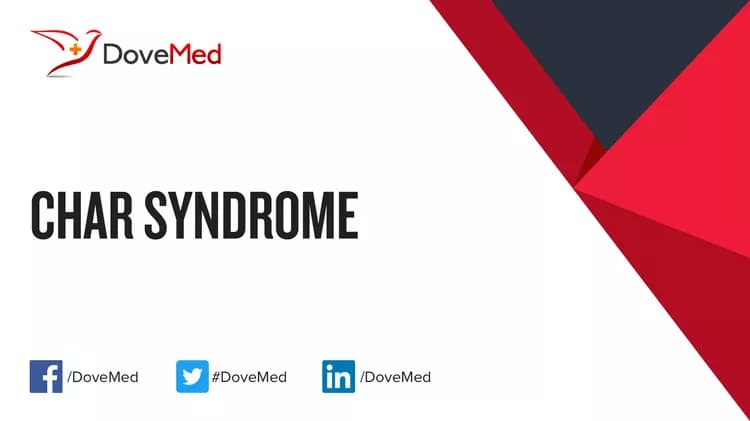What are the other Names for this Condition? (Also known as/Synonyms)
- CHAR
- Patent Ductus Arteriosus with Facial Dysmorphism and Abnormal Fifth Digits
What is Char Syndrome? (Definition/Background Information)
- Char Syndrome is a condition that affects the development of the face, heart, and limbs
- It is characterized by a combination of three major features: a distinctive facial appearance, a heart defect called patent ductus arteriosus, and hand abnormalities
- Char Syndrome is caused by mutations in the TFAP2B gene and is inherited in an autosomal dominant fashion
(Source: Char Syndrome; Genetic and Rare Diseases Information Center (GARD) of National Center for Advancing Translational Sciences (NCATS), USA.)
Who gets Char Syndrome? (Age and Sex Distribution)
- Char Syndrome is a rare congenital disorder. The presentation of symptoms may occur at birth
- Both males and females may be affected
- Worldwide, individuals of all racial and ethnic groups may be affected
What are the Risk Factors for Char Syndrome? (Predisposing Factors)
- A positive family history may be an important risk factor, since Char Syndrome can be inherited
- Currently, no risk factors have been clearly identified for this syndrome
It is important to note that having a risk factor does not mean that one will get the condition. A risk factor increases one’s chances of getting a condition compared to an individual without the risk factors. Some risk factors are more important than others.
Also, not having a risk factor does not mean that an individual will not get the condition. It is always important to discuss the effect of risk factors with your healthcare provider.
What are the Causes of Char Syndrome? (Etiology)
- Char syndrome is caused by mutations in the TFAP2B gene and is inherited in an autosomal dominant fashion
(Source: Char Syndrome; Genetic and Rare Diseases Information Center (GARD) of National Center for Advancing Translational Sciences (NCATS), USA.)
Autosomal dominant: Autosomal dominant conditions are traits or disorders that are present when only one copy of the mutation is inherited on a non-sex chromosome. In these types of conditions, the individual has one normal copy and one mutant copy of the gene. The abnormal gene dominates, masking the effects of the correctly function gene. If an individual has an autosomal dominant condition, the chance of passing the abnormal gene on to their offspring is 50%. Children, who do not inherit the abnormal gene, will not develop the condition or pass it on to their offspring.
What are the Signs and Symptoms of Char Syndrome?
The signs and symptoms of Char Syndrome may include:
- Broad forehead
- Broad nasal tip
- Distal/middle symphalangism of 5th finger
- Highly arched eyebrow
- Intellectual disability, mild
- Low-set ears
- Parasomnia
- Protruding ear
- Thick eyebrow
Very frequently present symptoms in 80-99% of the cases:
- Depressed nasal ridge
- Downslanted palpebral fissures
- Everted lower lip vermilion
- Hypertelorism
- Malar flattening
- Patent ductus arteriosus
- Ptosis
- Short philtrum
- Thick vermilion border
- Triangular mouth
Frequently present symptoms in 30-79% of the cases:
Occasionally present symptoms in 5-29% of the cases:
- Hearing impairment
- Mesoaxial foot polydactyly
- Myopia
- No permanent dentition
- Persistence of primary teeth
- Prominent occiput
- Sleep disturbance
- Supernumerary nipple
- Symphalangism of the 5th finger
- Ventricular septal defect
(Source: Char Syndrome; Genetic and Rare Diseases Information Center (GARD) of National Center for Advancing Translational Sciences (NCATS), USA.)
How is Char Syndrome Diagnosed?
Char Syndrome is diagnosed on the basis of the following information:
- Complete physical examination
- Thorough medical history evaluation
- Assessment of signs and symptoms
- Laboratory tests
- Imaging studies
- Biopsy studies, if necessary
Many clinical conditions may have similar signs and symptoms. Your healthcare provider may perform additional tests to rule out other clinical conditions to arrive at a definitive diagnosis.
What are the possible Complications of Char Syndrome?
The complications of Char Syndrome may include:
- Severe heart defects
- Intellectual impairment
Complications may occur with or without treatment, and in some cases, due to treatment also.
How is Char Syndrome Treated?
The medication(s) listed below have been approved by the US Food and Drug Administration (FDA) as ‘orphan products’ for treatment of Char Syndrome.
FDA-approved indication - Ibuprofen lysine: For closure of a clinically significant patent ductus arteriosus in premature infants weighing between 500 and 1500 g, who are no more than 32 weeks gestational age when usual medical management (e.g., fluid restriction, diuretics, respiratory support, etc.)
(Source: Char Syndrome; Genetic and Rare Diseases Information Center (GARD) of National Center for Advancing Translational Sciences (NCATS), USA.)
How can Char Syndrome be Prevented?
Currently, Char Syndrome may not be preventable, since it is a genetic disorder.
- Genetic testing of the expecting parents (and related family members) and prenatal diagnosis (molecular testing of the fetus during pregnancy) may help in understanding the risks better during pregnancy
- If there is a family history of the condition, then genetic counseling will help assess risks, before planning for a child
- Active research is currently being performed to explore the possibilities for treatment and prevention of inherited and acquired genetic disorders
Regular medical screening at periodic intervals with tests and physical examinations are recommended.
What is the Prognosis of Char Syndrome? (Outcomes/Resolutions)
- The prognosis of Char Syndrome is dependent upon the severity of the signs and symptoms and associated complications, if any
- Individuals with mild conditions have better prognosis than those with severe symptoms and complications
- Typically, the prognosis may be assessed on a case-by-case basis
Additional and Relevant Useful Information for Char Syndrome:
The following DoveMed website link is a useful resource for additional information:
Related Articles
Test Your Knowledge
Asked by users
Related Centers
Related Specialties
Related Physicians
Related Procedures
Related Resources
Join DoveHubs
and connect with fellow professionals


0 Comments
Please log in to post a comment.